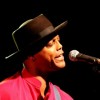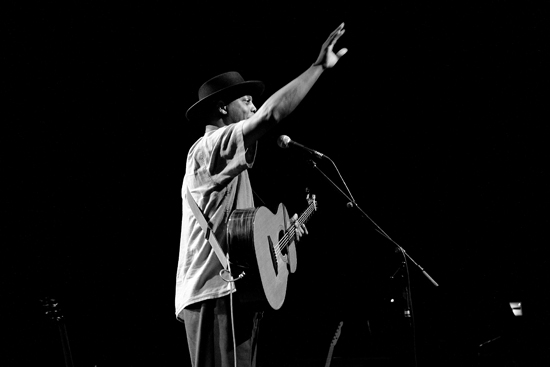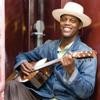ITW de Eric Bibb – Going Back to His Roots
Préparée et réalisée par Frankie Bluesy Pfeiffer pour Blues Matters (UK)
Retranscription : Nathalie Nat’ Harrap
Forever young, Eric Bibb, a troubadour keeps spreading the Blues throughout the world in case we forgot its roots. Nominated many times for multiple Blues Music Awards and a Grammy, Eric cannot help touching us by his sincerity, honesty and humanity. If only there were more Eric Bibbs in the world…
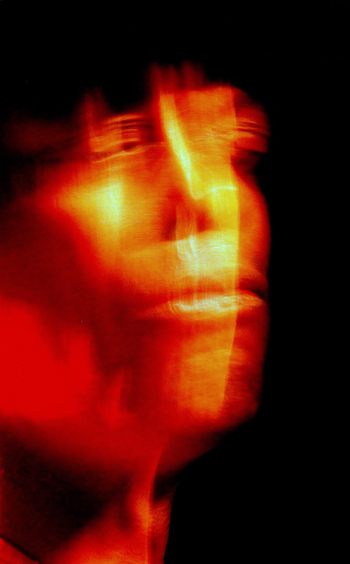
BM: Rather than talking about the album that is just about to be released by Dixiefrog, ‘Deeper in the Well’, let’s go back to the previous one, ‘Blues Ballads and Work Songs’. You seem to have gone back to your roots?
Eric: Yes, that’s right because I felt that their style of playing and the songs were too good and too important for them to be forgotten. The most important thing for me is that I feel connected to some kind of tradition, to the old guys and their music, there’s a kind of lineage. I wanted to join a band and play that kind of music, I felt I had to be included in this lineage. I felt I should contribute because of my own way of playing too.
Do you feel you have this special relationship with this style of music because you are an African American?
That’s an interesting question! It’s true that many white players play very very well but I think when you’re singing tradition, it’s a little different, a little more mysterious. Maybe there is the African connection but I also believe there may be a genetic connection to this music, not just cultural. I wanted people to know that there are younger African American musicians who are still keeping this tradition and for a long time this style of music was kind of ignored by African Americans and the interest came from young white coloured people. I felt that all these musicians should not be forgotten, I wanted to play tribute to my heroes.

Do you think you had to do this album because even though you only look as if you are in your thirties, in fact you are now 60?
It’s true, I thought it was time to take stock and I was ready to make this statement, to tell people that we shouldn’t forget where we came from, where my music came from. I felt I had reached the necessary maturity to make this contribution. To make this kind of statement, it takes time, you know.
How did you choose these songs?
I chose songs which were close to me, songs which meant something to me. I chose songs that my father and his contemporaries had sung. I have to feel personally connected to these songs, I have to feel them otherwise I am just a copy. They have to feel close to my world, to my own experience.
Most of your albums have been nominated for awards? How would you feel if your next album wasn’t nominated for anything?
You know it’s nice to be recognized by your contemporaries. It’s nice to know that people are listening to you and appreciate what you do, but that’s not why I make records. I make records because I love playing music and I love sharing it. I feel I have been out here long enough to put out songs that I feel are right for me. And in the end, I don’t feel bad if I don’t get the award, it’s not really important. I don’t get upset because to be honest, I am always more excited about the next project. For me, the most exciting is to write a new song, to get a new guitar. If I had to choose between getting a Grammy and writing a new song, I will always choose a new song.
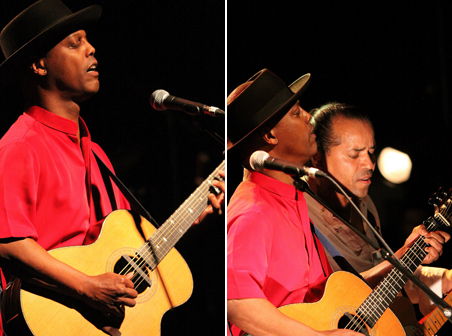
Is it more exciting to create a new song or perform in front of your public?
(smiles) It goes hand in hand because you know, you may be alone in the kitchen in the middle of the night, you light a candle and all over sudden, you get this new song and it’s a great feeling but really I am very eager from then on to share it. I want to record it, I want to sing it live.
The ‘Troubadour Live’ is a live album like ‘Live à FIP’. Out of the last three albums, two were recorded live. Is that what you prefer?
I love recording and performing live. It’s like I need both sides of the coin
Between the ‘Troubadour Live’ and the ‘Live à FIP’ albums, you also recorded ‘Booker’s Guitar’ which was a tribute to Bukka White. And before that you recorded another album which was also a tribute to Paul Robeson. Why did you choose these singers?
I have to feel a personal connection, the connection to Bukka White was the guitar. This was unexpected and I thought there must be a reason why I got his guitar, why did it happen. I knew Bukka White of course but I went a little deeper, investigated and I felt I could do a tribute not only to him but the whole genre. This was my way into Blues Ballads because they are connected, it was like opening a door if you like.
In the past you have worked with other musicians but lately you’ve worked alone, right?
I like working with good musicians. It’s very exciting. I am working on a project I have just finished, which I recorded in Mali and it’s great but it is also important to prove to myself that I can be a one man band and with Blues Ballads and Work songs, I think I have established I can do it, that I can produce good work on my own.

Do you believe one single guitar can be more than just one instrument?
Yes, that’s my goal. I was always fascinated by the fact that you could even play orchestral with a guitar. You can play melody, you can play bass line and lots of other stuff and it should feel like nothing is missing. It may not be as harmonic as a mandolin but for me, the goal is one voice and one instrument.
Which one is the most important to you? The voice or the guitar?
If you have to choose, the most important is the voice. Absolutely.
You’ve always preferred the acoustic guitar. Can you imagine that one day you would look at playing and recording with an electric guitar?
Well, I play some electric guitar. I played one or two songs where I used electric but I don’t play an electric guitar like Hendrix played an electric guitar, I play an electric guitar like an acoustic guitar. But basically the style is the same, it’s just the sound that’s different and in a way that affects your singing too.
Do you think you would ever record a tribute to an electric guitar player?
It’s difficult because most electric guitar players are known for their soloing and their fast playing and that’s just not my style. If I play electric guitar, you’re going to hear my finger picking style. But I love to work with musicians who can improvise and play a solo to accompany me because I am not a solo player. I love this kind of collaboration, I think that sound is something very special.
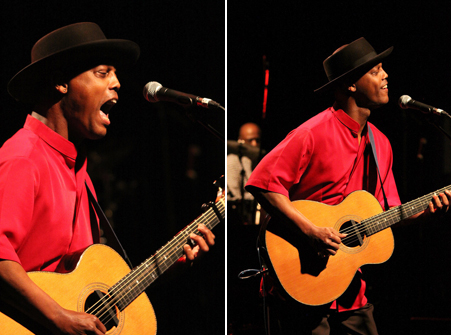
But surely collaborating with electric guitar players must be difficult because they could overshadow your style?
No, because the musicians I work with understand my style of playing and appreciate it, so they complement it and it’s really exciting. It works very well. It’s like when I worked with Amar Sundy, he adapted his style to suit mine. We have to contribute separately, that’s the secret of collaboration when you write a song together. It’s a democratic system, you don’t want to dominate. You know the contributions must be equal.
When will the new album be released?
I think it will be next October also through Dixiefrog of course.
And so we will see you soon in Paris?
I hope so and I am hoping to be touring in Europe. I have some dates in Germany and in the UK already and I am hoping in France too, so yes I hope to see you there too.
